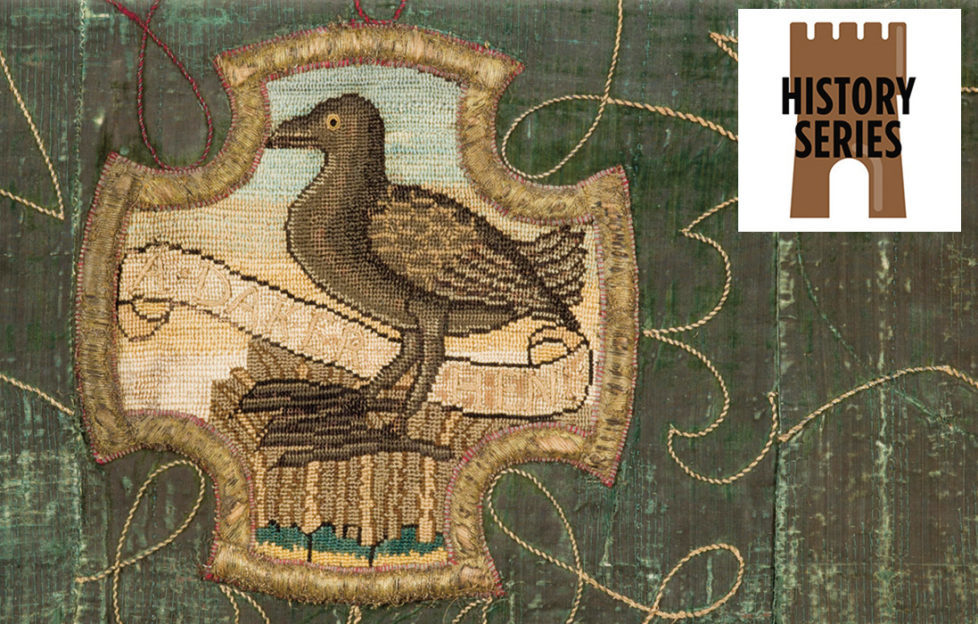A Stitch In Time

WRITTEN BY ALISON CARTER
Could the displaced Queen find common ground with her hosts?
Mary laid down her needle and rubbed at the joints of her hand.
“Rheumatism again?” said Bess, barely looking up. “You need exercise.”
“You are not to tell me what I need,” said Mary.
It had been their rhythm for twelve years: a little bickering, a little silence
Silence descended on the two women. It had been their rhythm for twelve years: a little bickering, a little silence, needles in and out. Mary Stuart, Queen of Scots, was thirty-eight; Elizabeth, Countess of Shrewsbury, fifty-four. Mary had been placed in the custody of Bess, and her husband the Earl, by Queen Elizabeth who feared Mary might threaten her throne.
Both women embroidered. Neither would admit to the other that needlework was their salvation and their escape.
They were working on a series of hangings – tent stitch worked upon canvas, laid on green velvet. Mary liked to take embroidery designs from the books that came with her entourage. Bess was a working class girl made good and took no nonsense. Now on her fourth marriage, and one of the richest women in England, Bess often said that she hadn’t got where she was by looking at picture books.
“Ouch!” Bess dropped her needle.
Mary saw blood beading on Bess’s thumb. It was odd: Bess rarely made an error.
“I’ll stop,” Bess said. “I’m tired.”
Mary was fretful the next day. She began to complain about a reduction of her staff, ordered by the Earl.
Bess sighed.
“I don’t want to talk about this now.”
Mary was astonished. Bess of Hardwick loved a debate.
“Let’s just sew?” Bess said more gently.
“Will any of your children be visiting?” enquired Mary.
Bess sighed…
“I hope so. I am fortunate in my children, that much is true.”
“Are you well?” asked Mary suddenly.
There was a long silence. These women didn’t share their feelings.
“It’s nothing… money matters.”
“You, troubled by money!”
“No, it’s George. You know how a man keeps his fortune close.”
This was intimate talk indeed.
Mary was angry…
That night at dinner, the Earl was irritable. He complained about the expense of Mary’s entourage.
“Never fewer than sixteen staff,” he growled.
“Which is my right as a queen,” Mary replied.
“You presume a great deal, in my house!” said the Earl.
Mary was angry at being thus spoken to. “I will walk in the grounds,” she said.
“You are not permitted,” Bess said.
“For God’s sake, let her!” barked George. “She can’t actually run away to France!” He stood up and strode towards the door, where he turned. “Bess, I am losing patience!”
Mary heard the stamp of his boots across the hall. Suddenly Bess put her head in her hands, and Mary heard a sob. She stood and laid a hand on Bess’s hair. It was astonishingly soft, though completely grey. Mary realised that she had never touched Bess, not in twelve years.
“My husband says he is tired of being jailer. He threatens to petition the Queen.”
Mary froze. “Then where would I go?”
“I don’t know. Men hold the power.”
“Even with a woman on the throne, and even with your wealth?”
“But my money is his.” Bess looked up, wiping her eyes. “While he…”
“Still lives!” They spoke in perfect unison, and both of them burst out laughing.
“I love the man, truly I do,” said Bess, “but we women have no real choice.”
“True.”
“I fear that this marriage is slipping away from me.” Bess stood. “But to our needles! I admire the colours of your gown, the red against the black. I think we should copy them in a new panel.”
Mary looked down at her dress. Bess had never paid her a compliment before.
“I hope that my hair is as lovely as yours when I am older,” Mary said. “Let us go together.”
As they walked, Mary felt that a change had occurred. The sharing of their troubles and their fears had, after years of distance and frostiness, bound them. Their rich silks glowed in the torchlight, but they were after all just two women, understanding each other’s pain.





